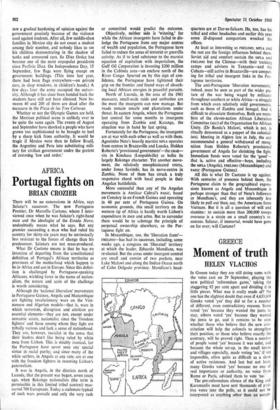Portugal fights on
AFRICA BRIAN CROZIER
There will be no concessions in Africa, says Salazar's successor. The new Portuguese Premier, Dr Marcello Caetano, whom I inter- viewed once when he was Salazar's right-hand man and the ideologist of the Estado Novo, undoubtedly means what he says. But any premier succeeding a man who had ruled his country for thirty-six years may be intrinsically less resistant to the forces of change than his predecessor. Salazars are not mass-produced.
What Dr Caetano means is that he has no intention of departing from the constitutional definition of Portugal's African territories as provinces of the motherland which happen to be in Africa and not in Europe. Since this defini- tion is challenged by Portuguese-speaking Africans, wielding force in the name of nation- alism, the nature and scale of the challenge is worth considering.
Although the 'national liberation' movements in Portuguese Guinea, Angola and Mozambique are fighting revolutionary wars on the Viet- namese and Algerian models—that is, wars in which terrorism, disruption and attrition are essential elements—they are not, except under semantic strain, nationalist since the 'freedom fighters' and those among whom they fight are tribally various and lack a sense of nationhood. They are, however, racialist in the sense that their leaders don't like being ruled by white men from Lisbon. This is doubly ironical, for the Portuguese have never seen any special virtue in racial purity; and since many of the white settlers, in Angola at any rate, are at one with the freedom fighters in resenting Lisbon's paternalism.
It was in Angola, in the districts north of Luanda, that the present war began, seven years ago, when Bakongo nationalists (the term is permissible in this limited tribal context) mas- sacred 700 Europeans. Today a stalemate typical of such wars prevails and only the very rash
or committed would predict the outcome.
Objectively, neither side is 'winning,' for while the African insurgents have failed to dis- lodge the Portuguese from any major centres of wealth and population, the Portuguese have failed to reduce the areas of terrorist or guerrilla activity. As if to lend substance to the marxist equation of capitalism with imperialism, the Gulf Oil Corporation is investing $200 million in the Cabinda area—an enclave north of the River Congo. Spurred on by this sign of con- fidence, the Portuguese have tightened their grip on the frontier and found ways of absorb- ing local African energies in peaceful pursuits.
North of Luanda, in the area of the 1961 massacre, small-scale raids and ambushes are the most the insurgents can now manage. But roads remain unsafe and plantations under threat. In eastern Angola, where the Portuguese lost control for some months to insurgents operating from Zambia and Katanga, the situation was in hand by last spring.
Fortunately for the Portuguese, the insurgents are at war with each other as well as with them. Agostinho Neto's heavily marxist MPLA operates from centres in Brazzaville and Lusaka. Holden Roberto's 'provisional government'—the GRAE- sits in Kinshasa (Leopoldville) as befits its largely Bakongo character. Yet another move- ment, the relatively unsophisticated uNrra, under Jonas Savimbi, has its nerve-centre in Zambia. None of them has struck a truly responsive chord with local people in their Angolan battlefields.
More successful than any of the Angolan movements is Amilcar Cabral's PAIGC, based on Conakry in ex-French Guinea and operating in 40 per cent of Portuguese Guinea. On economic grounds, this small territory on the western tip of Africa is hardly worth Lisbon's expenditure in men and arms. But to surrender there would be to sabotage the principle of perpetual ownership elsewhere; so the Por- tuguese fight on.
In Mozambique, too, the 'liberation front'- FRELIMO—has had its successes, including, some weeks ago, a congress on 'liberated' territory at which the leader, Eduardo Mondlane, was re-elected. But the areas under insurgent control are small and consist of two pockets, near Lake Malawi and along the Indian Ocean north of Cabo Delgado province. Mondlane's head- quarters are at Dar-es-Salaam. He, too, has his tribal and other headaches and earlier this year some ill-disposed compatriots wrecked his offices.
At least as interesting as FRELIMO, MPLA and the rest are the foreign influences behind them. Soviet aid and comfort sustain the !APIA and FRELIMO but the Chinese—with their training camps and advisers in Tanzania—and the Cubans—still active in Brazzaville—are compet- ing for tribal and insurgent links in the Por- tuguese territories.
The anti-Portuguese 'liberation movements, indeed, must be seen as part of the wider pic- ture of the war being waged by militants throughout southern or white Africa—a struggle from which even relatively mild governments, such as those of Zambia and Senegal, find it difficult to dissociate themselves. Both are mem- tiers of the eleven-nation African Liberation Committee (ALc) of the Organisation for African Unity. (Dr Banda's Malawi, which is not, is ritually denounced as a puppet of the colonial. ists). Meeting in Algiers late in July, the ALC recommended a general withdrawal of recog- nition from Holden Roberto's provisional government of Angola for shrinking the fight. Immediate funds were voted for the `good'— that is, active and effective—boys, including the MPLA (Angola), FRELIMO (Mozambique) and Place (Portuguese Guinea).
All this is what Dr Caetano is up against. With centuries of presence behind them, the Portuguese claim to the geographical expres- sions known as Angola and Mozambique is perhaps stronger than that of Neto's followers or Mondlane's, and they are inherently less likely to pull out than, say, the Americans from Vietnam. But it is all a question of will and stamina : to sustain more than 200,000 troops overseas is a strain on a small country's re- sources. Salazar, if immortal, would have gone on for ever; will Caetano?






































 Previous page
Previous page